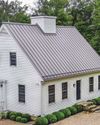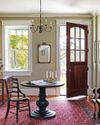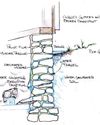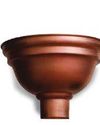
AS A CARRIAGE HOUSE
The original carriage house was dilapidated: Early on, horses had taken their toll, while, more recently, changes to accommodate an RV had destroyed the historical character. “The new homeowners saw a fun, quirky old building worth saving,” says Cambridge, Mass., architect Frank Shirley. His design adds vehicle storage, as there are four drivers in the family. A game-room getaway for teenagers and a private retreat for guests fill the loft area above the garage bays.
Like early electric lighting, most early garages were plain. (Having electricity, or an automobile, was status enough.) Today the garage is expected to do more, from storing grownup toys for four seasons to providing a workshop or plant room or home office. With the cost of new construction, it makes sense to hire a designer for your project and to make the most of it. No matter whether you have a vintage home or a new house designed along traditional lines, you don’t want to end up with “a garage with a house attached.”
The garage was at first a utilitarian building separate from the house. By the 1920s—when it might be built alongside the house rather than at the back of the lot—the garage was increasingly tied to the house proper by a loggia, pergola, or breezeway. A low wall between house and garage formed a courtyard (or, at least, a laundry yard). The “walled compound” look was particularly popular for English and French Revival houses. The attached garage became more popular after fear of gas fires subsided, although many codes continued to require fire walls.
This story is from the {{IssueName}} edition of {{MagazineName}}.
Start your 7-day Magzter GOLD free trial to access thousands of curated premium stories, and 9,000+ magazines and newspapers.
Already a subscriber ? Sign In
This story is from the {{IssueName}} edition of {{MagazineName}}.
Start your 7-day Magzter GOLD free trial to access thousands of curated premium stories, and 9,000+ magazines and newspapers.
Already a subscriber? Sign In

Navigating the Lumberyard - Here's some lumber lingo you should know before you venture into a lumberyard.
Here's some lumber lingo you should know before you venture into a lumberyard. Almost everyone fixing an old house will end up at a lumberyard-whether it's a local supplier or the organized aisles of a big-box home-improvement store.

a farmhouse renewed
Sensitive renovations and restoration work preserved a house that dates to 1799.

AN OVERVIEW OF METAL ROOFING
METAL ROOFS ARE RESURGENT, FOR GOOD REASONS.

ENDURING BEAUTY IN WALLS of STONE
Now back in the family who had been here since 1830, the old farmhouse is again ready for generations to come. Additions dating to 1840 and the 1950s were preserved.

ARCHITECTURAL DETAILS COME TO LIFE
Owners and their designer celebrate the unique features of a 1912 Arts & Crafts Tudor.

For a Wet Basement Wall
If there's problem common to old houses, it's a wet basement. I'm not talking about occasional flooding, but rather a basement that apparently seeps or leaks after even a rain shower or during snowmelt. Several approaches are available; sustainable solutions will get to the root of the problem.

Patching a Plaster Wall
Fix a hole in the wall with a few common tools and some drywall supplies. Practice your technique!

Roofing & Siding
Make note of these historical and unusual materials for the building envelope.

The Riddle of the water
When water incursion happens, the roof isn't necessarily the culprit. Maybe snaking a drain line, or clearing debris from a clogged gutter, temporarily will stem a leak. But a recurring problem usually means other forces are at work. It takes persistence-and a team with the right skills and patience—to identify the source and apply a solution.

Light-filled Craftsman Redo
For a dark kitchen in a 1914 Illinois house, the trick was anchoring white expanses with woodsy warmth.